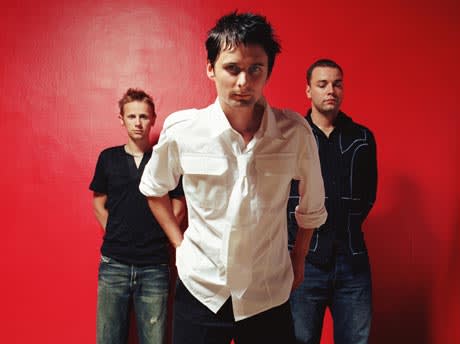If all you know of Muse is their debut then this will be a rude awakening, as they have mutated into a vociferously different beast, amalgamating rock, prog, metal, classical and god knows what else into a delightful histrionic ooze. Nicky Wire once wrote of the current crop of bands, "What happened to demanding the impossible? and from that Muse seems to take their musical cue. The deceptively gentle and lilting "Sing for Absolution rises and falls on Matt Bellamys eerie falsetto, while "Stockholm Syndrome pauses for loud, ferocious guitar clashes on more than one occasion. Tempos, dynamics, styles change faster than the listener can grasp and its all wrapped up in, at times, a ridiculous amount of melodrama. The emotional heart, and best track, is "Blackout, where Bellamys musical epiphanies finally coalesce together in a tragic waltz, propelled by strings and again, his falsetto. There is much here to divide listeners but the point that Muse and other bands wearing their heart on their sleeve are making is not whose right, but the fact that opinions are being made and defended and people are talking. Someone is demanding the impossible and thats only a good thing.
Is there a certain aim or ethos behind amalgamating many different genres? Bellamy: We didnt want to be one of those bands to restrict themselves or stick within a certain genre. Its about whats underneath, a kind of simplistic emotion that is inside most people, not just the surface. I dont know how to say this, but its like the more diverse the surfaces are, the more likely you are to hear whats underneath.
Whats the inspiration for the album art? We wanted to do something a bit epic to kind of match up with the epic nature of this album and we developed toward this idea of a judgement day, where all these souls have been chosen to go away and theres one person whose looking up, not being chosen, being left behind. The idea of that emotional moment of what it feels like to not be the chosen one. I find that to be sad.
What was the motive to recording the bulk of the album in rural Ireland? We like the contrast between working in the city and working in rural places. In more rural places, you dont have access to everything and you work with what youve got and have to look inside yourself more to find experimentation as opposed to looking outside yourself. The best stuff weve done has been in rural locations as weve pushed ourselves further as we didnt have access to technology or equipment in a city.
(Warner)Is there a certain aim or ethos behind amalgamating many different genres? Bellamy: We didnt want to be one of those bands to restrict themselves or stick within a certain genre. Its about whats underneath, a kind of simplistic emotion that is inside most people, not just the surface. I dont know how to say this, but its like the more diverse the surfaces are, the more likely you are to hear whats underneath.
Whats the inspiration for the album art? We wanted to do something a bit epic to kind of match up with the epic nature of this album and we developed toward this idea of a judgement day, where all these souls have been chosen to go away and theres one person whose looking up, not being chosen, being left behind. The idea of that emotional moment of what it feels like to not be the chosen one. I find that to be sad.
What was the motive to recording the bulk of the album in rural Ireland? We like the contrast between working in the city and working in rural places. In more rural places, you dont have access to everything and you work with what youve got and have to look inside yourself more to find experimentation as opposed to looking outside yourself. The best stuff weve done has been in rural locations as weve pushed ourselves further as we didnt have access to technology or equipment in a city.
